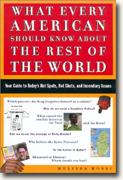Melissa Rossi
book reviews:
· general fiction
· chick lit/romance
· sci-fi/fantasy
· graphic novels
· nonfiction
· audio books
· author interviews
· children's books @
curledupkids.com
· DVD reviews @
curledupdvd.com
newsletter
win books
buy online
links
home
for authors
& publishers
for reviewers

 |
What Every American Should Know About the Rest of the World: Your Guide to Today's Hot Spots, Hot Shots, and Incendiary Issues Melissa Rossi Plume Paperback 400 pages April 2004 |
|
I like to think that Iím a reasonably well-read woman. However, M.L. Rossiís What Every American Should Know About the Rest of the World gave me a serious kick in the pants. In fact, what most of us donít know about the world could fill a book. This book anyway.
For each country, Rossi includes what she calls "Fast Facts" -- things like capital, form of government, population, language, religion, etc. Then she summarizes historical, political and cultural issues that Americans may or may not fully understand. She uses humor, maps and photographs to lighten the material and facts and statistics to support her opinions where they are offered. At first, I treated Rossi like I do doctors. I looked up everything she said, especially those bits of information that seemed counter to what Iíve believed for years or when something seemed too pat. Try as I might, I couldnít find fault with any of her facts. Even when it was something Iíd never heard of before, I found tons of references in the literature. My own ignorance continued to astound me as I progressed through the book. Just as troubling was the ignorance of family, friends and acquaintances. For example, none of us had a clue as to why Saddam Hussein invaded Kuwait back in the 1990s. My husband remembered that the Iraqis looted the Kuwaiti treasury and posited that robbery was the motive. A friend thought that maybe there was a border dispute. Several people opined that Saddam was a bad man and thatís what bad men do. No one knew that Saddam invaded Kuwait because wells on the Kuwaiti side of the border had been slant drilled into reservoirs on the Iraqi side. In effect, he thought that Kuwait was stealing Iraqís oil. When I went looking for that little nugget, I was astonished to see references to the controversy in almost every global news story of the time. How did I miss such an important fact at the time? Back when the Shah of Iran was deposed and the revolutionaries took Americans hostage, a friend of mine reacted with puzzlement. ďWhatís their beef?Ē I didnít have an answer. The motives of the chanting mob were as inexplicable to me as they were to him. Some Americans, at a loss to explain anti-American feelings around the world, have come up with a variety of naÔve opinions. "They hate us because we are free" or "They are jealous of our lifestyle" are the two I hear most often. Somehow I think itís a little more complex than that. As Rossi implies in her prologue, whatís going on now is influenced by what went on before. For example, for many of us trying to understand why China was so put out when George Bush referred to mainland China and Taiwan as two different countries, it was like arriving in the middle of a movie. Nothing makes sense when seen out of context. However, these little issues of protocol donít slap most of us in the face and force us to understand why folks behave the way they do. We slug along, listening to CNN and talking heads with political agendas. Too busy and too self-absorbed to do much fact-checking, we only half-understand things going on in the next county, let alone the conflicts between India and Pakistan over Kashmir. However, lucky for us, Rossi has done the leg work. This book is chock-full of odd little details that help explain the news. It could be a handy reference when the Hutus and Tutsis start whacking each other again, or you could sit down like I did and read it cover to cover. I know, I know. It sounds ponderous, but in fact, it is absolutely fascinating. © 2004 by Joyce Faulkner for Curled Up With a Good Book |
|
|
|
 Click here to learn more about this month's sponsor! |
|
| fiction · sf/f · comic books · nonfiction · audio newsletter · free book contest · buy books online review index · links · · authors & publishers reviewers |
|
| site by ELBO Computing Resources, Inc. | |
 Rossiís goal is to create ďa contextual mapping of the worldís geopolitical hot spots.Ē Presented in a combination Cliffs Notes/Travel Guide type format, the author divides the book into Tickers, Slow Tickers and Talkers. Tickers are those places most liable to explode any time soon. Slow Tickers are problems waiting to happen. Talkers play such an important part in the global community that we keep hearing about them.
Rossiís goal is to create ďa contextual mapping of the worldís geopolitical hot spots.Ē Presented in a combination Cliffs Notes/Travel Guide type format, the author divides the book into Tickers, Slow Tickers and Talkers. Tickers are those places most liable to explode any time soon. Slow Tickers are problems waiting to happen. Talkers play such an important part in the global community that we keep hearing about them.